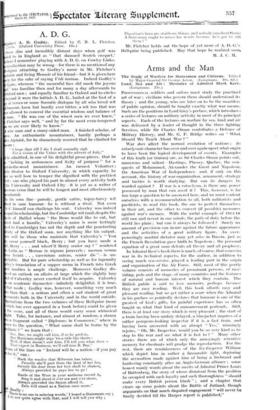A. D. G.
iquiae: A. D. Godley. Edited by C. R. L. Fletcher. vols. (Oxford University Press. 188.) those dim and incredibly distant days when golf was led to in England as " that damned Scotch croquet,' lieve I remember playing with A. D. G. on Cowley Links. recollection may be wrongâfor there is no mention of any -stigma attaching to Godley's name in Mr. Fletcher's insble and living Memoir of his friendâbut it is given here r for the sake of saying Vidi tantum. Indeed Godley's whereon " the mournful face did mask the joyous d," was familiar then and for many a day afterwards to Oxford men ; and equally familiar to Oxford and to circles beyond it were the initials A. D. G., hailed at the foot of a of verses or some Socratic dialogue by all who loved wit humour, keen but hardly ever bitter, a wit too that was er allowed to conceal the essential wisdom and balance of man. " lie was one of the wisest men we ever knew," Fletcher says well, " and by far the most even-tempered a we are ever likely to know."
wise man and a many-sided man. A finished scholar, of rse. An enthusiastic mountaineer, hardly perhaps a be Alpinist, for he shamelessly avowed that he climbed for -ure : " I hope that till I die I shall annually sigh For a vision of the Valais with the advent of July,"
he admitted, in one of his delightful prose-pieces, that he " lacking in seriousness and fixity of purpose " for a I-in-the-wool mountaineer. An earnest Volunteer ; lie Orator to Oxford University, in which capacity lie v so well how to temper the dignified with the prettiest it ; one who played his part in almost every activity both the University and Oxford Cityâit is yet as a writer of orous verse that Ise will be longest and most affectionately enihered.
n his own lineâparody, gentle satire, topsy-turvy wit bed in sane humourâhe is without a rival. Not even '. C. himself can challenge his seat. Calverley was indeed equal in scholarship, but the Cambridge wit (and, despite the yds of Balliol whom " the Dons would like to cut, but not find a handle," Calverley's name is more lastingly ed to ('ambridge) has not the depth and the penetrating tlety of the Oxford man, nor anything like his output. re will be those who maintain that Calverley's " You v swear yourself black, Berry ; but you have made a It, Berry . . . and whort'll Berry senior say ? " rendered Latin as Morum to nigram juraveris ; morum verum am fecisti . . . vaccinium autem, senior die "-- is un- chable. But for pure scholarship as well as for ingenuity ley's translation of a supper menu in French into Greek lie iambics is ample challenge. Moreover Godley dis- till an outlook on affairs at large which the slightly lazy d of Calverley never exerted itself to acquire. Calverley an academic rhymesterâinfinitely delightful, it is true, that mode ; Godley was, however, something very snuck re than thatâa serious and often a sad student of great cements both in the University and in the world outside. notations from the two volumes of these Reliquiae (none Which has ever appeared in a book before) could be given the score, and all of them would carry some whimsical fight. Take, for instance, and almost at random, a stanza a fragment called " Diplomas in Commerce," where in wer to the question, " What name shall be borne by the didate ? " we learn that :
Bus. Bac. we might call him, if so he prefers, But Musicians might urge 'tis a title like theirs : Well, if that doesn't suit him, I'll tell you what doesâ That expert in Business, we'll call him B. Bus." me of the lines on " Ireland will be a nationâif you pay for it," run :
" Mark the resolve that Hibernia has taken, Proudly she'll part from the land of her foe, ⢠Sternly his dust trom her feet shall he shaken, Always provided he pays her to go !
Bards of the West in your anthems record it, Sing it and shout it o'er sea and o'er shore, Always provided the Saxon afford it,
Erin will stand as a Nation once more."
finally : There is no use in mincing words,' I heard a Statesman cry ;
I do not quite agree with that; and I will tell you why ; Digestion's laws are stubborn things, and nobody ean chenethein: A Statesman ought to mince his words because he's got to eat them I "
Mr. Fletcher holds out the hope of yet more of A. D. G.'s Reliquiae being published. May that hope be realized soon.
M. J. C. M.






















































 Previous page
Previous page